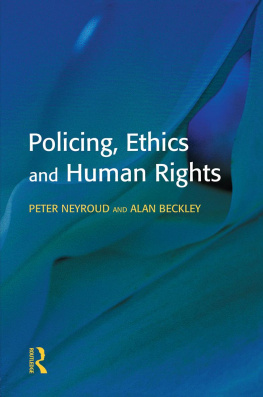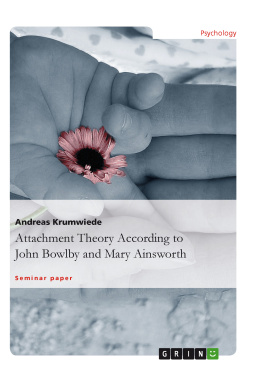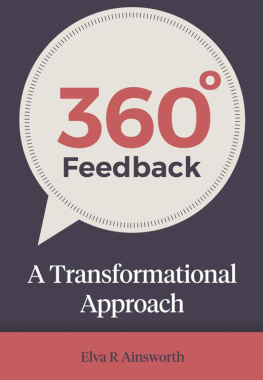Policing and Society Series
Series editors: Les Johnston, Frank Leishman, Tim Newburn
Published titles
Policing, Ethics and Human Rights, by Peter Neyroud and Alan Beckley
Policing: a short history, by Philip Rawlings
Policing: an introduction to concepts and practice, by Alan Wright
Psychology and Policing, by Peter B. Ainsworth
Private Policing, by Mark Button
Published by Routledge
2 Park Square, Milton Park, Abingdon, Oxon, OX14 4RN
711 Third Avenue, New York, NY 10017
Peter B. Ainsworth 2002
The right of Peter B. Ainsworth to be identified as the author of this Work has been asserted by him in accordance with the Copyright, Designs and Patents Act of 1988.
All rights reserved; no part of this publication may be reproduced, stored in a retrieval system, or transmitted in any form or by any means, electronic, mechanical, photocopying, recording or otherwise without the prior written permission of the Publishers or a licence permitting copying in the UK issued by the Copyright Licensing Agency Ltd, 90 Tottenham Court Road, London W1P 9HE.
First published 2002
Reprinted 2005
ISBN 1-903240-45-X (cased)
ISBN 1-903240-44-1 (paper)
British Library Cataloguing-in-Publication Data
A catalogue record for this book is available from the British Library.
Publisher's Note
The publisher has gone to great lengths to ensure the quality of this reprint but points out that some imperfections in the original may be apparent.
Introduction
The fields of psychology and policing may not, at first glance, appear to make very obvious bedfellows. Whilst the former discipline may be associated in the publics mind with laboratory based experiments, the lattes public image may be more of dangerous work involving the pursuit of menacing criminals. If psychology and policing have one thing in common it is perhaps that each suffers from considerable misunderstanding about what they involve. The publics perception of psychology may indeed be of an individual carrying out experiments in a laboratory, but it may equally be of a Freud-like therapist carrying out psychoanalysis on some unfortunate individual who is struggling to make sense of a feeling of anxiety. Alternatively a more recent image may be of a psychological profiler portrayed in some fictional television series using his supposed powers to help the police crack some difficult case or other. In terms of policing, a member of the publics image may be drawn from seeing police officers dealing with rioting on the streets, or from having recently been stopped for a minor traffic offence.
The point is that both psychology and policing are multifaceted professions, yet images of each are formed often from biased media portrayals or from brief encounters with members of one of the professions. Few members of the public, let alone most police officers, will have come across a psychologist in their day-to-day life and will thus have little idea as to what exactly this discipline has to offer. Some of the stereotypes about each profession are encapsulated by Martin Reisser. Recalling his early experiences as the first ever police psychologist to be appointed in the USA in 1968, Reisser recalls that at that time:
Police tended to view psychologists as fuzzy-headed, cloud-nine types who had trouble finding the rest room. Psychologists in turn tended to perceive the police as ham-handed rednecks, brutal, insensitive, and preferring muscle over mind.
(Reisser, 1995: xii)
White and Honig (1995: 258) suggest that police officers and psychologists have often been wary of each other. According to these authors, police officers may have a prejudice against psychologists because of certain areas in which they have come across such individuals. These include:
Watching do-gooder psychologists testifying on behalf of criminals. |
Dealing with mentally ill individuals who have been inappropriately released back onto the streets by a psychologist. |
Seeing psychologists apparently protecting malingerers within the organisation who appear to be weak officers who are abusing the system. |
Labelling psychologists as the enemy as they have the power to prevent a person from joining the force, or can prevent an officer returning to work if they are deemed to be unfit for duty. |
Lest the reader thinks that there is any truth in any of these views, it is perhaps appropriate to consider what psychologists do, or do not do.
The most simple definition of psychology is that it is The Study of Behaviour. Many psychologists might prefer to describe their work as the study of human behaviour, although a few individuals still spend much of their time studying animals other than humans. This definition is simple but it doesnt really tell us much about how psychologists go about their work. It might be argued that sociologists, social anthropologists and psychiatrists also study human behaviour, yet there are notable differences between these disciplines and psychology.
Psychology likes to consider itself a science and as such often adopts experimental methods similar to those used in other sciences. This is one reason why a great deal of psychological research is carried out within the psychology laboratory, where conditions can be controlled and extraneous variables eliminated. However, some within the profession have argued that the laboratory is not an appropriate place to study the many subtleties and complexities that human behaviour can involve. Nevertheless, psychologists are generally united in their wish to study human behaviour in a systematic, methodical and controlled way. Such study has led to the accumulation of a great deal of knowledge about many of the factors that underlie human behaviour, although, as with any relatively new discipline, much more remains to be uncovered.
But psychology has now become more than the simple study of human behaviour. The knowledge that has been accumulated has enabled professionals to work with individuals and organisations and to apply the results of the work. Thus in the field of education, educational psychologists can help to identify the reasons why individual children may be experiencing difficulties and to offer help to both the individual and the school. Clinical psychologists can also use their knowledge base to help those suffering from behavioural problems or mental illness to tackle their difficulties more effectively. Organisational psychologists can also work towards improving the functioning of large companies and by so doing improve the welfare of employees.
In all of these examples, psychologists are able to use an accumulated knowledge to understand people and, hopefully to help them. But what has all this to do with policing? It will be argued throughout this book that policing is also about understanding and dealing with people. Whilst the fictional portrayals of police work shown on our television screens may have us believe that police work is an all action job with danger lurking around every street corner, the reality is that most tasks performed by police officers involve simple interactions with members of the public. Yet comparatively little training time is devoted to teaching police officers how to deal with such encounters successfully and professionally. A police officer who has to convey news of a sudden death to a distraught relative may have little training in how this might be carried out in the most empathetic way and instead may fall back on intuition or advice offered by colleagues in the police canteen. Learning how to deal sympathetically with victims of crime may not come high on a list of training priorities yet such an ability will have a profound effect on victims perceptions of the police.









